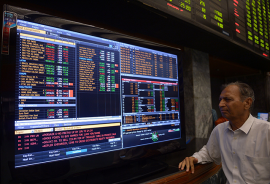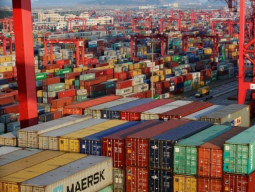
Its peers may be struggling with power outages, failing to meet export orders, and laying off workers, but Ashfaq Textile Mills appears to be bucking the trend, with soaring profits and an expanding workforce.
The Faisalabad-based company manufactures grey, dyed and bleached fabrics and exports most of its products to the United States and the European Union. Even while other exporters have complained bitterly of how the power crisis has increased their cost of doing business and hurt their ability to meet export orders, Ashfaq Textile has seen its profits hit record levels.
For the nine months ending March 31, 2012, the company’s net income rose to Rs54.4 million, or Rs7.77 per share, an astonishing 294% higher than the same period in the previous year. In the first nine months of this fiscal year, the company has earned more in profits than any years since it was listed on the Karachi Stock Exchange in 1991.
How does this company manage to do so well while its neighbours are faltering so badly? Sheikh Ashfaq Ahmed, the CEO, attributes the success to three factors: a lack of debt financing, investments in training the workforce, and a singular focus on one product line.
“We have not taken any loans from banks, which means that we can keep running while others spend on increasing interest payments,” said Ahmed.
The company seems to have benefited from learning bitter lessons of experience: in 2009, after having gone through the shocking rise in interest rates during the financial crisis of 2008, the company decided to go on a deleveraging kick, rapidly repaying its debt, which currently stands at less than Rs100 million, down from more than twice that amount three years ago.
Another masterstroke for the company appears to be the investments it has made in training its workforce. “We have a human resource training department where we train our people,” said Ahmed. “Because of that programme, we have been able to dramatically cut back on production losses. Hence, while others have been forced to lay off workers because of the energy crisis, we have continued to expand our workforce.”
Ashfaq Textile owns a large amount of land in Faisalabad and has been using that land to slowly add capacity to its existing product lines. Ahmed has had a singular focus on the company’s only product line, choosing not to enter into other businesses which he sees as a distraction.
“I am doing what I can control,” he said. “Other industrialists took on huge amounts of debt and started projects in multiple business lines. I prefer to use my retained earnings to install more machinery and units for my existing product line.”
Such is his zeal for having a focused business that Ahmed refuses even to go into manufacturing linens and home textile products, considered the logical next step for most fabric manufacturers. “The margins in that business are higher, but so is the rejection rate,” explained Ahmed, who says he currently has so many orders for his fabric business that he is turning away customers.
Ahmed – who is the majority shareholder in Ashfaq Textile – has used the opportunity afforded to him by his company’s success to devote more time to philanthropic endeavours. He is a founding trustee at the Liver Centre District Hospital in Faisalabad, and spends most of his days at the hospital, rather than at the factory.
The company’s stock closed at Rs10.75 in trading on the Karachi Stock Exchange on Monday, up 4.7% for the day. Since the start of the company’s financial year on July 1, 2011, the stock has risen 125%. Yet investors looking to capitalise on this success story in the textile sector will be disappointed. Ashfaq Textile is a highly illiquid stock, with no trading on most days. The average volume traded over the last year is less than 340 shares per day.
Published in The Express Tribune, June 19th, 2012.
COMMENTS (4)
Comments are moderated and generally will be posted if they are on-topic and not abusive.
For more information, please see our Comments FAQ













































It's good that they are meeting their export commitment and hope the trend will be maintained.Some times a few listed companies show inflated profit to boost the price of their company' s share on stock exchange.
@hh ,i think thats nt necessary ,,it also depends on the managment qualification & thier experiences,,a good mangment even by having loans can effectivly run the business
"He is a founding trustee at the Liver Centre District Hospital in Faisalabad", I wish him more success and pray that other industrialists follow.
Textile sector is highly leveraged. In the past, it went on to finance its growth almost entirely through leveraging its balance sheet. Although it did support their business growth , but also increased the credit risk to alarming levels. They need to deleverage themselves, and take credit only for selected projects.